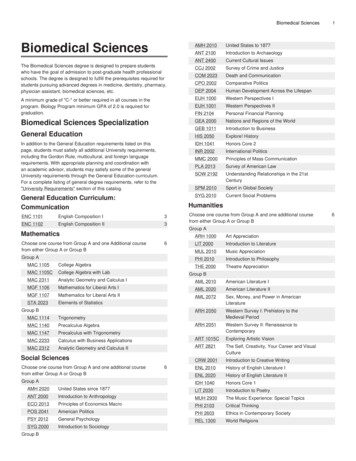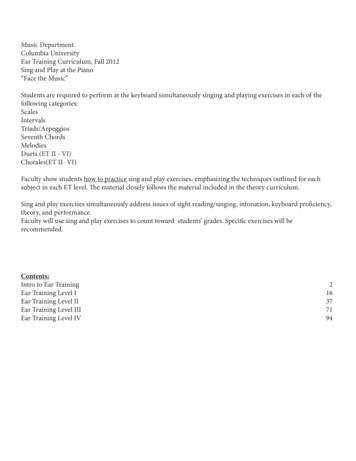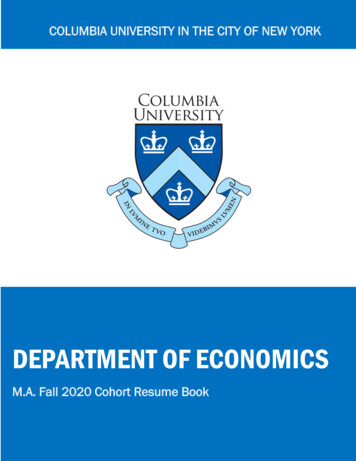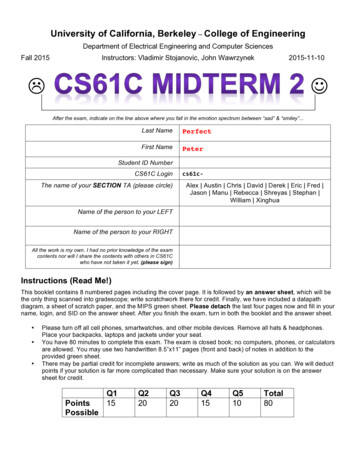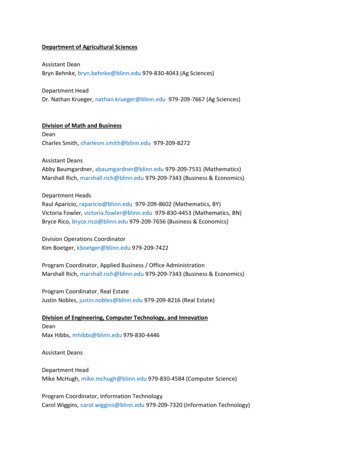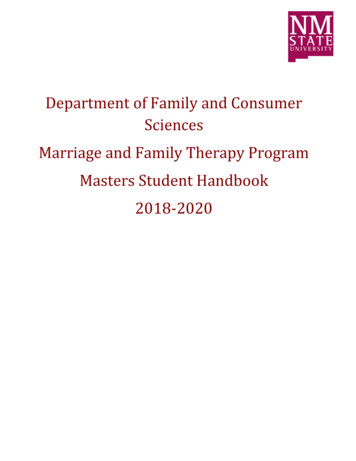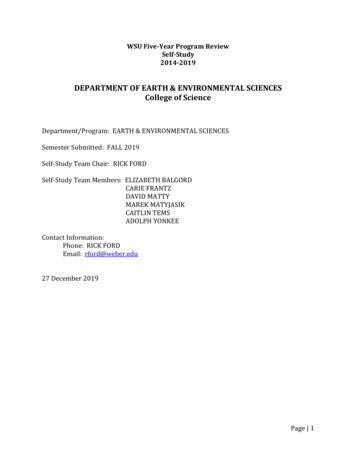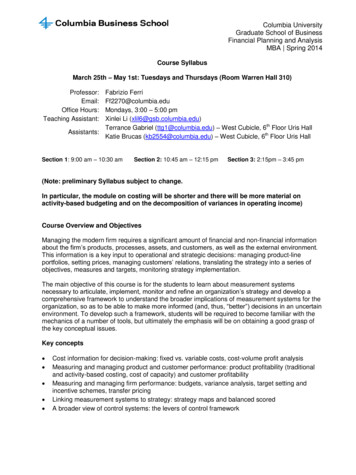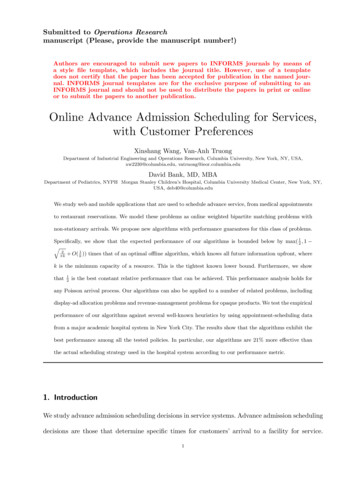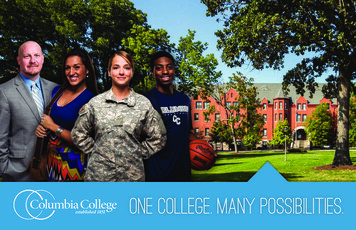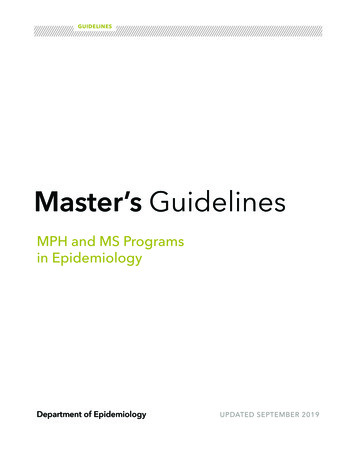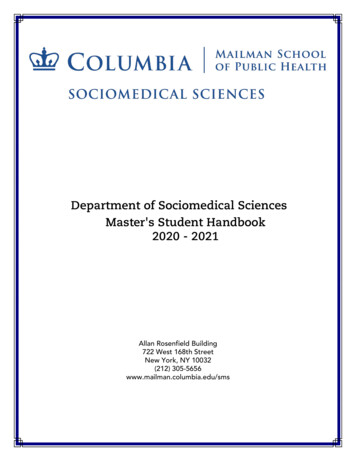
Transcription
Department of Sociomedical SciencesMaster's Student Handbook2020 - 2021Allan Rosenfield Building722 West 168th StreetNew York, NY 10032(212) 305-5656www.mailman.columbia.edu/sms
Department of Sociomedical SciencesMS and MPH Students Handbook: Table of ContentsGeneral Information and Resources . 3Financial Aid .4Email & Accessing Information .4Columbia Transportation Services .5Mailman Bias Response and Support System (BRSS) .5Columbia Gender-Based Misconduct Policies for Students .6Academic Affairs. 6Registration Process .6Holds .6Change of Program Period - Add/Drop .7Courses: Required, Selectives and Electives .7Tutorials .7Cross Registration .8Pass/Fail .8Course Waivers .8Transfer of Credits .8Incomplete Grades .9Leave of Absence / Inactive Status . 10Filing for Graduation . 10Learning Objectives.10Learning Objectives: Mailman School of Public Health . 10MPH Learning Objectives: Department of Sociomedical Sciences . 11MS Learning Objectives: Department of Sociomedical Sciences . 11Academic Advising.12Degree Requirements.14Columbia MPH Certificate Program (52 credits minimum) . 15Accelerated Program (42 credits minimum). 15Dual Degree Programs (42 credits minimum). 16Required Examinations and Certifications . 17Practicum Requirement . 17MS Degree Requirements . 18Practicum .19General Objectives . 19Roles and Responsibilities . 20Prior to the Practicum. 20Finding a Practicum Placement . 21Office of Field Practice (OFP) . 22i) Practicum Scope of Work Form . 22ii) Practicum Funding/Stipends . 23During the Practicum . 23Following the Practicum . 23Masters Handbook 2020-211
The Master’s Thesis.24Introduction . 24Planning your Thesis . 24The Thesis Course . 27Writing the Thesis . 30Reference Style . 30Appendices . 30Acceptable Thesis Formats . 301. Review Article . 312. Research Proposal . 333. Needs Assessment Proposal . 394. Program Evaluation Proposal / Program Evaluation . 425. Intervention Proposal . 466. Research Report . 51Appendix A Thesis Faculty Sponsors .55DisclaimerThe information contained in this handbook is correct for the academicyear 2020–21. The most up-to-date version can be found at dents/academics/student-handbooksAlthough the degree and academic requirements in place normally will not change within any given academic year,Mailman School and departmental policies are reviewed and updated regularly. The Department of SociomedicalSciences reserves the right to make changes at any time with appropriate notice to the community (e.g., emailnotification).2
OverviewThe Department of Sociomedical Sciences is dedicated to addressing the social forces thatinfluence health. Our research, teaching, and service are premised on the idea that tounderstand patterns of illness in society and to create effective programs that improvepopulation health, it is essential to account for the broad contextual factors that structurepeople’s actions, and to weigh the ethical and political factors that shape policy debates.Sociomedical Sciences draws upon a diverse range of analytic methods and conceptualframeworks from the social and behavioral sciences and humanities, including sociology,anthropology, psychology, history, and political science. Using these tools, our faculty andstudents explore a wide array of public health issues including sexuality, aging, obesity,urban health, HIV/AIDS, homelessness, tobacco and drug use, healthcare access, massincarceration, occupational and environmental health, and immigrant health. Our workemphasizes the critical importance of factors such as socioeconomic status, race, ethnicity,gender, and sexuality in determining health vulnerabilities.In 1968, the Columbia University School of Public Health became the first institution in thecountry to offer a graduate degree in Sociomedical Sciences (SMS). Dr. Jack Elinson, the firstchair of SMS, coined the term "sociomedical sciences" to incorporate the social sciences ofsociology, anthropology, economics, history, political science, and social psychology into amultidisciplinary study of health and medicine.Within SMS, four degrees can be pursued: The Master of Public Health (MPH), the Master ofScience (MS), the Doctor of Public Health (DrPH), and the Doctor of Philosophy (PhD). MPHgraduates from SMS go on to hold leadership positions in government, community-basedand non-governmental organizations, health care organizations, universities, think tanksand research consultancies, foundations and philanthropies, and media organizations. TheMS degree is of particular interest to mid-career professionals with health related interestsin fields such as nursing, medicine, health policy, bioethics, journalism, and law; postdoctoral students seeking to enhance their training by gaining additional analytic tools forpublic health policy making; and students seeking preparation for further study in a doctoralprogram.General Information and ResourcesThe Department of Sociomedical Sciences is located on the 5th and 9th floors of 722 West168th Street. Professor Kathleen Sikkema is the Chair of the Department of SociomedicalSciences. Professor Marita Murrman is the Deputy Chair of Masters Programs and Profe ssorRobert Fullilove is the Practicum Director, responsible for the practica of all the MPHstudents. Andrea Constancio is the Associate Director of Academic Programs. She isresponsible for all academic affairs related to the MPH, MS, and doctoral programs includingadmissions, academic progress, practicum, and graduation.Masters Handbook 2020-213
Financial AidStudents who need financial aid should contact the Financial Aid Office in the Mailman Schoolof Public Health. The types of student aid available, including loans, awards, and work-studyemployment, are outlined on the school web site. Fellowships and grants from governmentagencies and private foundations are available for graduate students. The amounts awarded,eligibility for the awards, and the basis for selecting recipients vary. Students interested inexploring these funding possibilities should consult with the Office of Financial Aid.Email & Accessing InformationColumbia UNI & EmailAn official Columbia University email address is required for all students. The University hasthe right to send official communications to the University email address, which is basedupon the University Network ID (UNI) assigned to the student.The University expects that every student will receive email at his or her ColumbiaUniversity email address and will read email on a frequent and consistent basis. A student'sfailure to receive and read University communications in a timely manner does not absolvethat student from knowing and complying with the content of such communications.Students may elect to redirect (auto-forward) email sent to their University email address.Students who redirect email from their official University email address to another address doso at their own risk. If email is lost as a result of forwarding, it does not absolve the studentfrom the responsibilities associated with communications sent to their official University emailaddress. ation-policy]SMS Listerv and E-weeklyThe department regularly sends information for master’s students such as programannouncements, practicum opportunities, and job postings for students. We also have adepartment weekly newsletter, sent Monday afternoons, with department announcements,shout-outs, and upcoming events and programs for all SMS faculty, staff, and students.Mailman Public Health and ColumbiaThe Mailman School of Public Health website, www.mailman.columbia.edu, providesinformation on academics, financial aid, career services, and other important topics.Important announcements are shared with students in a weekly e-mail produced by theOffice of Student Affairs every Thursday by means of “Transmission Action.”On the Columbia University home page (www.columbia.edu), under “Students,” are quicklinks to schedules of classes, schedules of finals, grades, registration holds and bulletins.Students can also access this information directly through Student Services Online (SSOL),ssol.columbia.edu.Students can access scholarly information and reference materials through the Columbia4
Libraries website, www.columbia.edu/cu/lweb. In addition to the collections, ColumbiaUniversity Libraries/Information Services provides many services to support graduatestudents - olumbia Transportation ServicesColumbia Transportation provides travel options and information that allows the Columbiacommunity to make safe, efficient, and timely travels to, from, and between Columbia'scampuses.Campus Shuttle ServiceA free campus shuttle bus service is available between the Columbia University MedicalCenter Campus, the Morningside Campus, and Harlem Hospital. A valid Columbia Universityidentification card is required. The shuttle runs between from early morning until late atnight, except in the summer, when there is no evening service between the Health Sciencesand Morningside Campuses. For up to date information about this and other shuttle busservices operated by Columbia University please check the Transportation Web site attransportation.columbia.edu.Campus Safety EscortsDuring the school year, the Department of Public Safety at the Morningside Campus providesa Walking Safety Escort Service performed by trained Columbia University students. Twotrained students, equipped with a Public Safety radio, will be sent to accompany students orstaff to their door any time from 7pm to 3am, seven nights a week.Morningside Campus Escort ServiceThis service is available from West 108th Street to West 110th Street between AmsterdamAvenue and Riverside Drive, and from West 111th Street to West 122nd Street betweenMorningside Drive and Riverside Drive. Please allow 5 to 15 minutes to arrive and askthem to show a Columbia University ID. For more information on the Walking EscortService, contact the Department of Public Safety's Operations Desk at (212) 854-SAFE(7233).Medical Center Escort ServiceOn the Medical Center Campus from 6:00PM until 6:00 AM escorts are provided by PublicSafety personnel on foot; vehicles may be used if available. The escort area is West 163rdStreet to West 168th Street, Riverside Drive to Amsterdam Avenue and from West 168Street to 178 Street, Broadway to Haven Avenue. A valid Columbia ID Card is required toobtain an escort. Please call 212-305-8100 to request an escort. Allow 10-15 minutes forthe escort to arrive.Mailman Bias Response and Support System (BRSS)The Mailman School of Public Health is committed to creating an inclusive working, learning,and living environment where all are respected. The occurrence of bias related incidents,involving conduct, speech, or expressions reflecting prejudice are an opportunity forMasters Handbook 2020-215
learning and growing as a community. All students, faculty, staff, and alumni and anyoneobserving or experiencing a potential bias-related incident involving our Mailmancommunity members can use BRSS. BRSS is one of many tools provided by Mailman that willsupport us as we co-create a community dedicated to learning and developing skills neededto bridge differences. More information and to access rt-system.Columbia Gender-Based Misconduct Policies for StudentsStudents are encouraged to familiarize themselves with university resources and policiesregarding sexual assault, sexual violence, sexual harassment, and gender-based misconduct.Students who believe they have been subjected to gender-based discrimination orharassment are encouraged to report these incidents. Upon receiving a report, the Universitywill respond promptly, equitably, and thoroughly. For more information or to report anincident of gender-based or sexual misconduct, https://sexualrespect.columbia.edu/ ortelephone to (212) 854-1717.Academic AffairsRegistration ProcessIncoming MPH students should note that the school registers students for their firstsemester core courses. In subsequent semesters, students will use Student Services Online(SSOL) to register for department, certificate, and elective courses.Registration for classes is held at the beginning of each semester and at the beginning of eachsummer session. You will receive information about these registration periods from theOffice of Student Affairs. Students should check SSOL for any holds on their accounts and toview their next registration appointment times.Each semester, course schedules for the entire university are published online in theColumbia Directory of Courses (www.columbia.edu/cu/bulletin/uwb/). The MailmanSchool of Public Health publishes a separate course schedule available online /academics/course-directory.Many courses require permission. In these cases, a note in the Mailman School online courselisting will indicate who should be contacted for permission. Students who register withoutpermission may be dropped from the class even after having registered for it.HoldsThe Office of Student Affairs may prevent a student from registering for classes by placing ahold a student’s registration. Examples include academic holds for incomplete courses,libra
Masters Handbook 2020-21 3 Overview The Department of Sociomedical Sciences is dedicated to addressing
